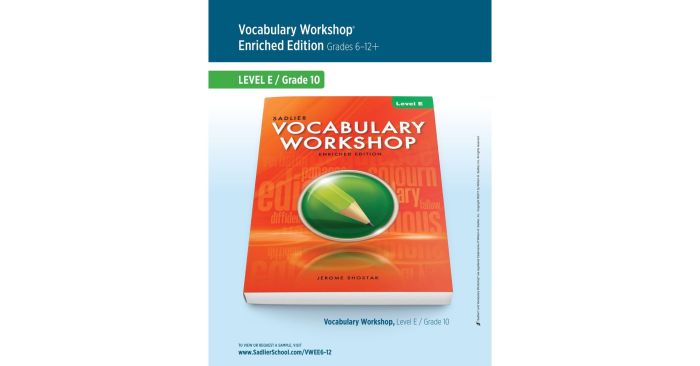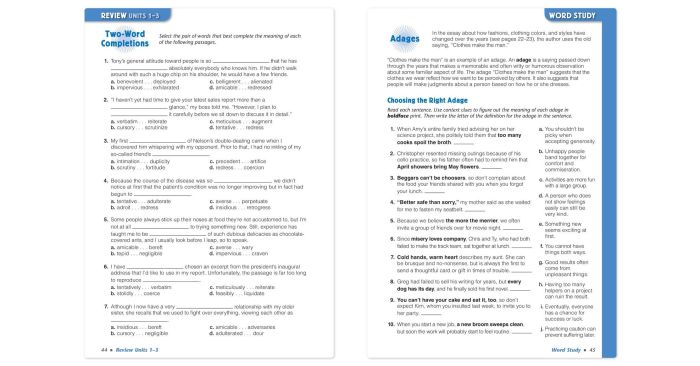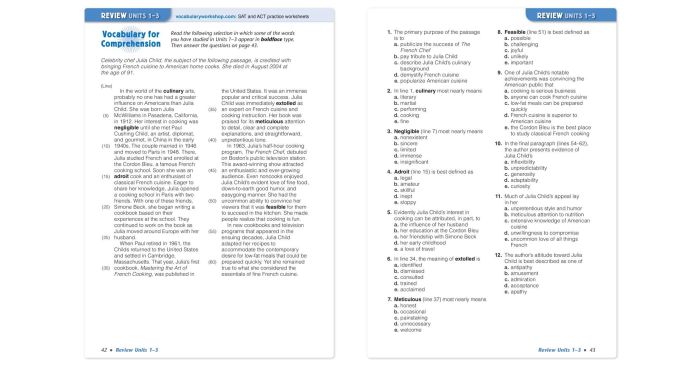The Vocabulary Workshop Level E PDF provides a comprehensive resource for vocabulary development, offering interactive activities, personalized learning, and effective assessment tools. This guide empowers learners to expand their vocabulary, improve comprehension, and enhance their communication skills.
With a focus on practical exercises and engaging multimedia resources, the Vocabulary Workshop Level E PDF makes vocabulary learning accessible and enjoyable. It promotes the acquisition of new words, strengthens word knowledge, and fosters a love for language.
Vocabulary Development

Vocabulary development is a crucial aspect of language learning that enriches communication skills and enhances overall language proficiency. Engaging and interactive activities can foster vocabulary acquisition, while incorporating multimedia resources provides diverse learning experiences that cater to different learning styles.
Personalized vocabulary lists enable learners to focus on specific areas of improvement, targeting words and phrases relevant to their interests and goals.
Interactive Vocabulary Games and Activities
Interactive vocabulary games and activities promote active engagement and make learning enjoyable. Some examples include:
- Word puzzles:Crosswords, word searches, and anagrams challenge learners to unscramble and identify words.
- Matching games:Matching words with definitions, synonyms, or images helps reinforce vocabulary.
- Role-playing:Acting out scenarios and using target vocabulary in context fosters natural language acquisition.
Benefits of Multimedia Resources
Multimedia resources enhance vocabulary learning by engaging multiple senses and providing authentic language exposure:
- Videos:Watching videos with subtitles or transcripts allows learners to hear and see words in context.
- Audio recordings:Listening to podcasts, audiobooks, or songs exposes learners to native pronunciation and intonation.
- Images:Visual aids such as pictures, charts, and diagrams help learners associate words with concrete objects and concepts.
Creating a Personalized Vocabulary List
Personalized vocabulary lists cater to individual learning needs and goals:
- Identify areas of interest:Determine specific topics or domains where vocabulary expansion is desired.
- Collect words from authentic sources:Gather words from books, articles, or conversations that align with the chosen areas.
- Categorize and prioritize:Organize words into categories and prioritize them based on frequency, difficulty, or relevance.
- Review and practice regularly:Dedicate time to reviewing and practicing the vocabulary list to ensure retention.
Vocabulary Practice Exercises
Vocabulary practice exercises are essential for developing and enhancing vocabulary skills. They help learners understand the meaning, usage, and context of new words, reinforcing their comprehension and retention.
There are various types of vocabulary practice exercises, each targeting specific aspects of vocabulary development. These include:
Definition Exercises
- Matching words with their definitions
- Writing definitions for given words
- Identifying the correct definition from a list
Synonym Exercises
- Identifying synonyms for given words
- Matching words with their synonyms
- Writing sentences using synonyms
Antonym Exercises
- Identifying antonyms for given words
- Matching words with their antonyms
- Writing sentences using antonyms
Usage in Context Exercises, Vocabulary workshop level e pdf
- Identifying the correct word to use in a given context
- Writing sentences using words in the correct context
- Understanding the meaning of words in different contexts
Online Vocabulary Practice Platforms and Resources
In addition to traditional vocabulary practice exercises, there are numerous online platforms and resources available to enhance vocabulary development. These include:
- Vocabulary.com
- Quizlet
- Merriam-Webster’s Word of the Day
- Newsela
- Duolingo
Vocabulary-Building Strategies
Effective vocabulary-building strategies include:
- Spaced Repetition:Reviewing new words at increasing intervals to improve retention
- Active Recall:Trying to recall words from memory without looking at notes
- Chunking:Breaking down large amounts of information into smaller, manageable chunks
- Mnemonic Devices:Using memory tricks, such as rhymes or images, to remember words
- Contextual Learning:Learning words in the context of reading or listening
Vocabulary Assessment

Vocabulary assessment plays a crucial role in evaluating students’ vocabulary knowledge and tracking their progress over time. It helps identify areas where students excel and areas that need improvement, enabling educators to tailor instruction and provide targeted support.
Various methods are employed for vocabulary assessment, each with its strengths and limitations. Standardized tests, such as the Vocabulary portion of the SAT or GRE, provide a standardized measure of vocabulary knowledge and are widely used for college admissions and placement purposes.
Portfolio Analysis
Portfolio analysis involves collecting a range of student work, such as essays, presentations, and projects, and analyzing the vocabulary used within these artifacts. This method provides a more holistic view of students’ vocabulary knowledge, as it assesses their ability to use vocabulary in context and communicate effectively.
Importance of Regular Vocabulary Assessments
Regular vocabulary assessments are essential for several reasons. They:
- Provide feedback to students on their progress and areas for improvement.
- Help educators monitor students’ vocabulary development and make informed instructional decisions.
- Identify students who may need additional support or enrichment opportunities.
- Motivate students to engage with new vocabulary and expand their vocabulary knowledge.
Comparison of Vocabulary Assessment Techniques
The following table compares different vocabulary assessment techniques and their effectiveness:
| Assessment Technique | Advantages | Disadvantages |
|---|---|---|
| Standardized Tests | Standardized, reliable, and widely accepted | May not assess vocabulary in context or writing ability |
| Portfolio Analysis | Holistic, assesses vocabulary in context | Time-consuming to score, may not be as reliable |
| Cloze Tests | Assesses vocabulary in context, provides immediate feedback | May be biased towards students with strong reading comprehension skills |
| Multiple-Choice Tests | Objective, easy to score | May not assess vocabulary in context or writing ability |
Vocabulary Resources: Vocabulary Workshop Level E Pdf

Online dictionaries and thesauruses are indispensable tools for vocabulary building. Some popular options include:
- Dictionary.com
- Merriam-Webster
- Thesaurus.com
- WordReference
Vocabulary-Building Apps
Numerous vocabulary-building apps are available, each with its unique features:
| App | Features |
|---|---|
| Quizlet | Flashcards, games, and spaced repetition |
| Anki | Spaced repetition system and customizable flashcards |
| Vocabulary.com | Adaptive learning, personalized word lists, and interactive exercises |
| Magoosh Vocabulary Builder | Word lists, quizzes, and analytics |
Recommended Books and Articles
For further vocabulary enhancement, consider reading the following:
- Word Power Made Easyby Norman Lewis
- The Vocabulary Builder Workbookby Chris Lele
- “How to Build a Better Vocabulary”by The New York Times
Questions and Answers
What is the target audience for the Vocabulary Workshop Level E PDF?
The Vocabulary Workshop Level E PDF is designed for learners of English as a second or foreign language who are at an intermediate level of proficiency.
What types of vocabulary exercises are included in the PDF?
The PDF includes a variety of vocabulary exercises, such as definitions, synonyms, antonyms, usage in context, and fill-in-the-blank exercises.
How can I use the Vocabulary Workshop Level E PDF to improve my vocabulary?
The PDF can be used as a self-study resource or as a supplement to classroom instruction. It provides clear explanations, examples, and exercises to help learners build their vocabulary effectively.